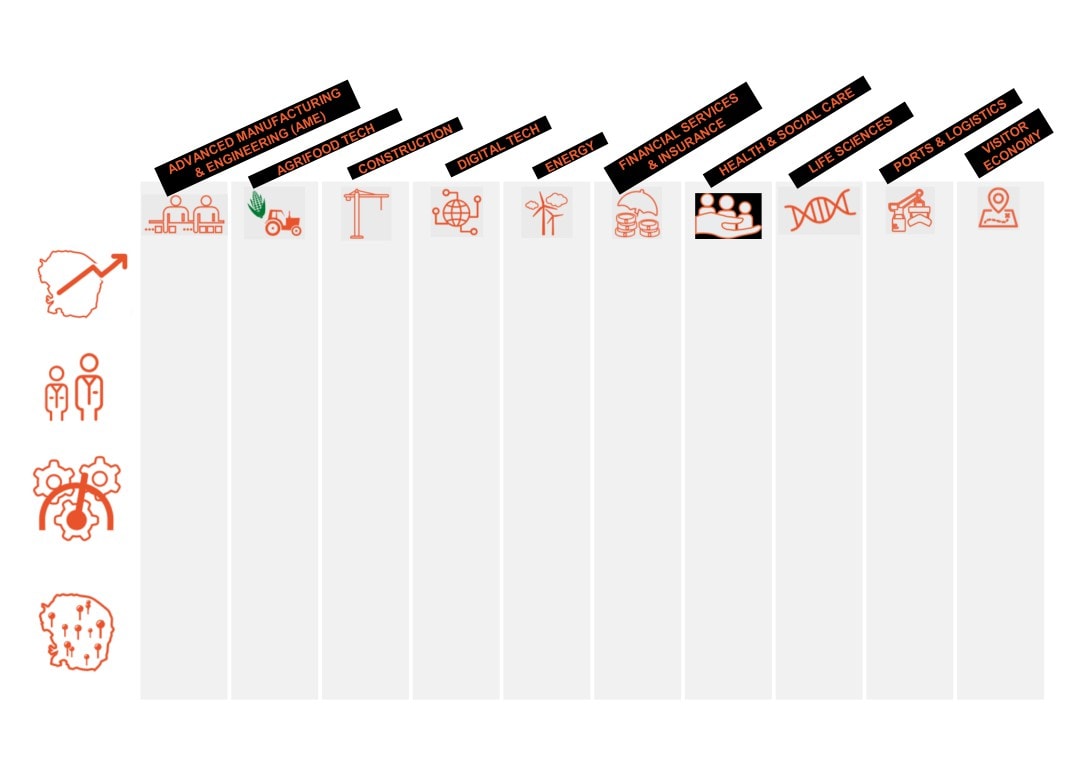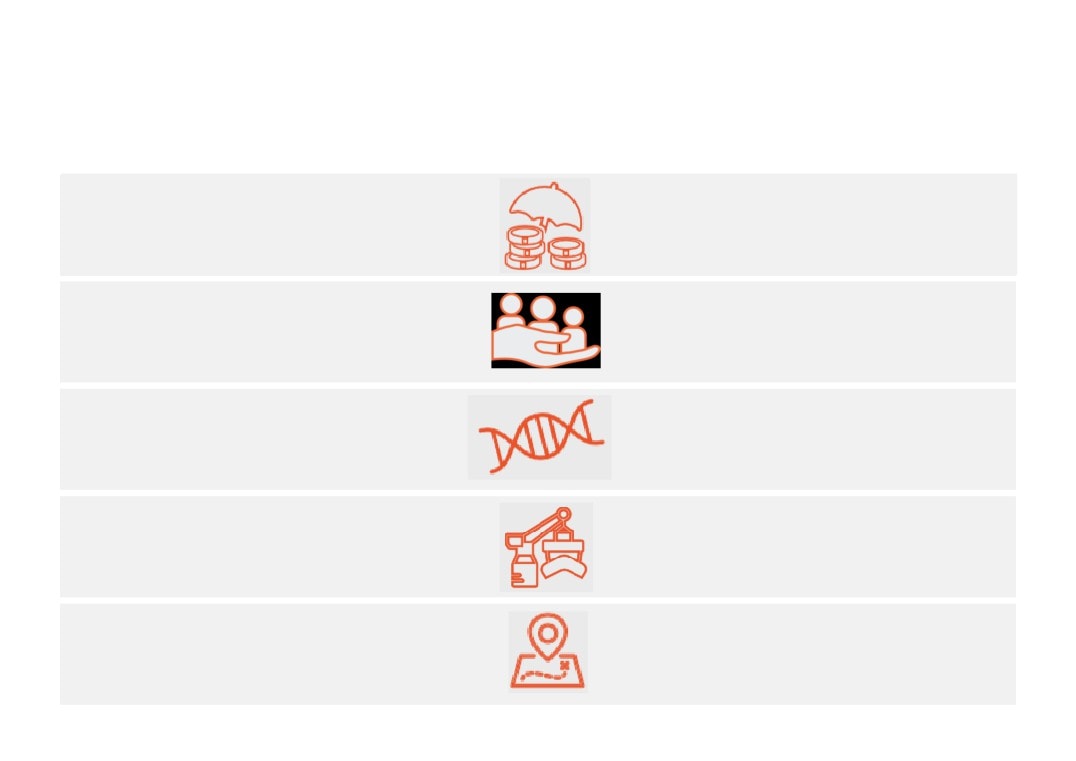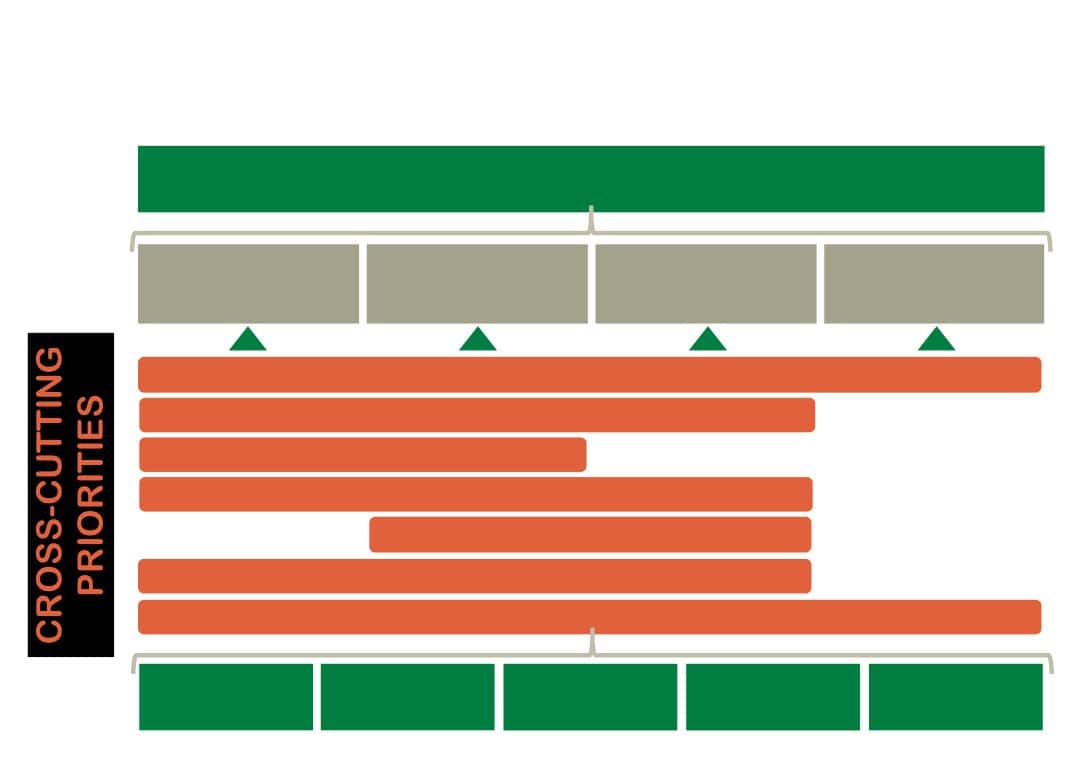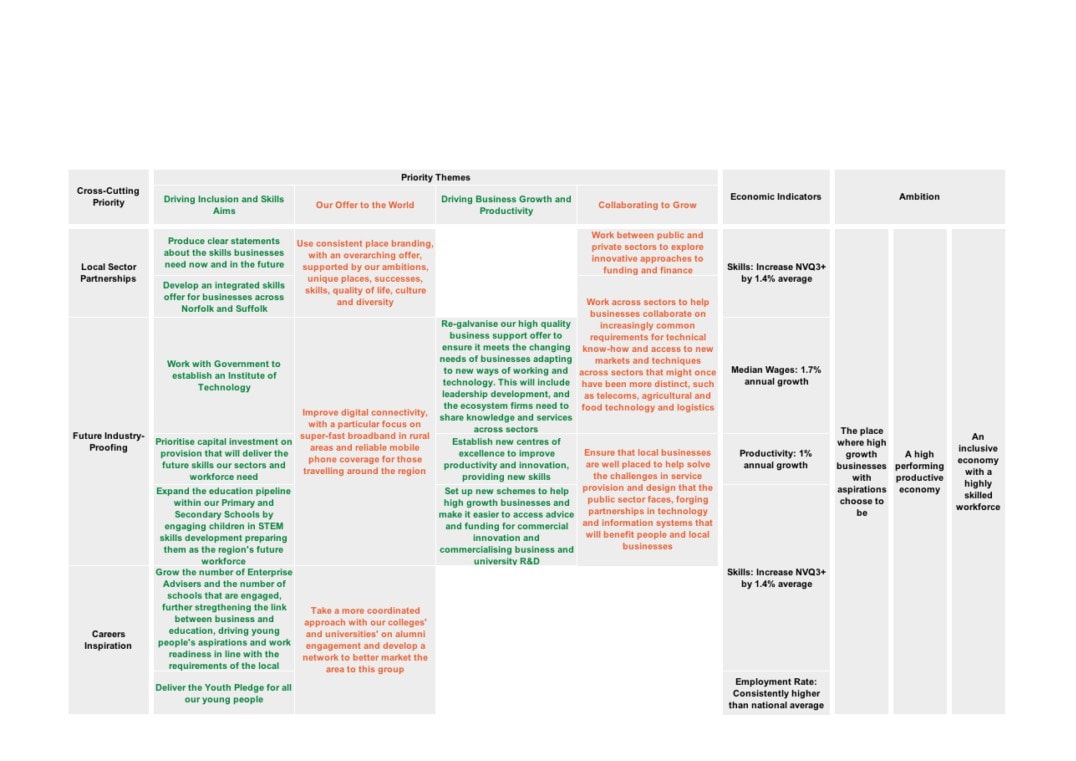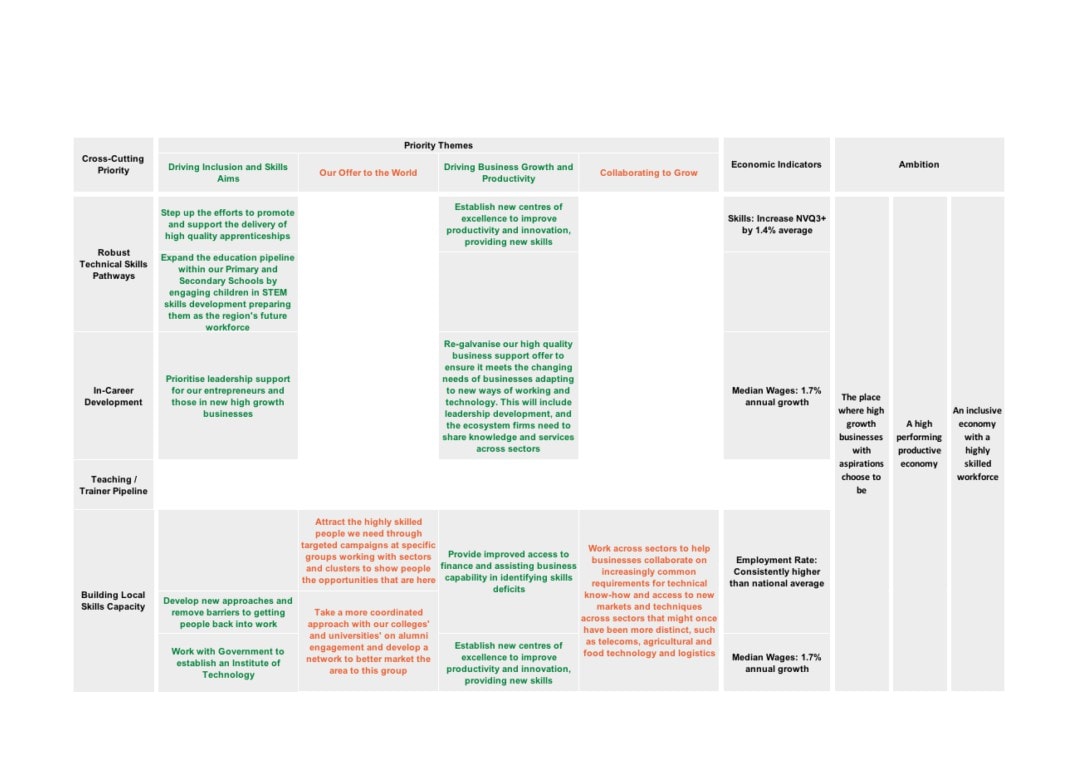NORFOLK AND SUFFOLK
CROSS-CUTTING SKILLS
REPORT
For LEP
Officers
FOREWORD
The New Anglia Skills Board places employers at
This cross-cutting report provides a high-level executive snapshot
of the ten skills plans that have been completed for our key
the centre of decision making on skills in Norfolk and
sectors.
Suffolk, to ensure the skills system becomes more
Skills opportunities and challenges are often shared by a number
responsive to the needs of employers, residents and
of our sectors and can be best tackled effectively and economically
the future economy.
on a cross-sector basis.
Sector Skills planning is absolutely vital to our local economic
As such, this report considers where skills needs ‘cross-cut’ some
ambitions, especially considering UK Modern Industrial Strategy
or all sectors, and where there is a case for local intervention
developments and the current high-profile Sector Deals.
across sectors to avoid duplication and achieve greater economy
and impact.
We realise though that strictly sector-defined approaches have
limitations for us at a local level:
Whilst the sectors covered by this work capture over two-thirds of
jobs in Norfolk and Suffolk, it does not capture all. However, these
• Not all businesses are either defined, or define themselves,
remaining jobs will also greatly benefit from the priorities that are
as part of only one sector
set out in this report. We are therefore committed to ensuring that
• Sectors overlap significantly in some areas
local skills planning encompasses the whole economy, and not just
key sectors in terms of growth and economic contribution.
• Sector definitions continually evolve
• Sectors often have great influence outside their own sector
Paul Winter
‘boundary’- e.g. through supply chains
Chair
• Risks of excluding many local people not working in our
key sectors
New Anglia Skills Board
2
OUR
OUR
POTENTIAL
CHALLENGES
A POPULATION THAT IS
A WORKING AGE POPULATION (16-64)
PROJECTED TO GROW
THAT IS SET TO REMAIN ROUGHLY THE
BY 11% (177,000 PEOPLE)
SAME SIZE (968,000 PEOPLE) OVER THE
BETWEEN NOW AND 2038
NEXT TWO DECADES
Source: 2015 Mid-year Population
Source: 2015 Mid-year Population
projections, Office for National Statistics
projections, Office for National Statistics
BETWEEN 2001 AND 2011, THE
A NET LOSS OF NEARLY 12,000
PROPORTION OF THE
PEOPLE WITH A LEVEL 4
POPULATION WITH A LEVEL 4
QUALIFICATION OR ABOVE ON AN
QUALIFICATION OR ABOVE
AVERAGE WORKDAY
INCREASED FROM 16% TO 23%
Source: 2011 Census, Office for National Statistics
Source: 2001 AND 2011 Censuses, Office for
National Statistics
WORKFORCE JOB NUMBERS
OVER 100,000 JOBS TO BE FILLED
INCREASED BY 50,000 (7%)
BETWEEN NOW AND 2024 DUE TO
BETWEEN 2010 AND 2015
PEOPLE LEAVING THE WORKFORCE
Source: New Anglia LEP Local Economic
Source: Working Futures 2014-024, UK Commission for
Strategy evidence base
Employment and Skills
GROWTH IN MEDIAN ANNUAL
MEDIAN ANNUAL WAGES ARE 91%
WAGES (2014 - 2016) ABOVE
(RESIDENCE) AND 89% (WORKPLACE)
NATIONAL AVERAGE
OF NATIONAL RATES
Source: Annual Survey of Hours and Earnings,
Source: Annual Survey of Hours and Earnings,
Office for National Statistics
Office for National Statistics
3
OUR SECTORS
£5.1bn
£3.6bn
£3.2bn
£1.4bn
£0.9bn
£2.1bn
£2.8bn
£0.9bn
£2.3bn
£2.3bn
(14%)
(10%)
(9%)
(4%)
(3%)
(6%)
(13%)
(2%)
(7%)
(6%)
GVA
84,500
79,000
70,700
24,400
7,800
29,200
101,900
10,000
48,700
89,100
(11%)
(10%)
(9%)
(3%)
(1%)
(4%)
(13%)
(1%)
(6%)
(11%)
JOBS
£60,500
£44,900
£45,400
£58,100
£120,800
£73,300
£27,500
£88,400
£47,900
£26,000
PRODUCTIVITY
(GVA per job)
6,000
8,300
9,400
4,400
400
1,900
2,500
700
4,100
7,100
(10%)
(14%)
(15%)
(7%)
(1%)
(3%)
(4%)
(1%)
(7%)
(12%)
ENTERPRISES
OUR CROSS-CUTTING
SECTORS
AgriFood Tech
(79,000 jobs)
1,500
jobs
5,200 jobs
IN TOTAL, THESE
18,900 jobs
SECTORS
400 jobs
ACCOUNT FOR
Advanced Manufacturing &
1,900
JUST OVER 545,000
Engineering (84,000 jobs)
jobs
JOBS, 69% OF THE
NEW ANGLIA TOTAL
5,700 jobs
1,200 jobs
Key:
2,700 jobs
Ports &
Logistics
(48,700 jobs)
Visitor Economy
5,900
(89,000 jobs)
jobs
5,400
jobs
OUR SECTOR
SKILLS CHALLENGES
Presented here is an overview of the skills challenges identified within each of the various sector skills plans:
Apprentices and students require real world work
Mobilising industry leadership in helping meet future
experience
workforce and skills supply challenges
Increasing supply of tutors with experience of the latest
Rising to the challenges and opportunities of Industry 4.0
technology
Build on and co-ordinate careers advice and guidance
Pressing need for increased supply of good STEM skills
Effects of automation on labour
Young people and progression
The ability to attract talent to the sector
Meeting demand for R&D staff / trainers and academics
Meeting existing skills shortages
Apprenticeships - a missed opportunity
A steady supply of talent
Improvements required to training provision
Minimising the effects of boom and bust on skills
Net out-migration of Graduate talent
The building of industrial partnerships is required
Growing demand for higher level qualifications
The need to combine resources and grow investment
Gaps in skill provision
New and broader talent pipelines required
A need for a better supply of local, graduate level, mechanical and
Key concerns linked to the future supply of employees
electrical engineering skills
into the sector
Employers need to access skills and workers locally from other
Imbalances in the workforce linked to age and gender
industries at key times, as much of their requirements are generic
Removing obstacles to residents securing jobs in the
Delivery of apprenticeships not linked to employer needs
sector
OUR SECTOR
SKILLS CHALLENGES
cont.
Mismatch between changing skills demands and ‘softer skills’
Sector training delivery with limited links to Norfolk and
output, with digital automation meaning that key job functions
Suffolk HE institutes
now shifting towards advisory and customer service activities
Concerns regarding the sector-relevancy of enterprise and
Apprenticeship take up for young people is relatively low
careers provision within schools and colleges
with SMEs finding the overall offer confusing to access
Entry and retention in the Health & Social Care
sector
Leadership and succession planning for registered
managers and owners
Recruitment and retention of registered nurses
in nursing homes
Sector cohesion - a lack of business groups, networks, and
Apprentices and higher apprenticeships up to level 7
infrastructure
The availability of ‘commercialisation’ skills and
The ability to recruit internationally, and the importance of
advanced data, maths and ICT skills
New Anglia as a place to attract and retain world class talent
Major change to the sector is coming, with most expecting
Automation and clean transport systems will accelerate
medium to long term growth in trade and transport volumes
rapidly over the next 5-10 years leading to a big increase
in demand for staff skilled in engineering, ICT and digital
Securing the workforce needed to sustain day to day
operations (e.g. drivers, warehouse staff) given that
Securing the management skills to drive change and
historically these gaps have been filled by migrant workers
promote trade, innovation and growth in the industry
A lack of a consistent local tourism sector/employer voice on skills
Some Culture sector stakeholders feel disconnected,
uniformed, and frustrated with local skills initiatives
Filling immediate front-line vacancies (e.g. housekeeping, bar-
work) with a concern that this will be exacerbated by Brexit
Concerns about the ‘employability’ of new Culture sector
entrants post qualifying (at all levels including Masters)
Young people consider tourism as a short-term job rather than a
career
Potential for freelancers in Culture sector to be isolated
OUR CROSS-CUTTING
DRIVERS OF SKILLS CHANGE
Based on the skills challenges identified by, and working with each sector, we have identified the following seven cross cutting issues, or
‘Drivers of Skill Change’, and what they mean in terms of local skills supply and development needs:
LACK OF
DEVELOPMENT
TEACHING /
INDUSTRIAL
PRESSING
SECTOR
SUITABLE,
POTENTIAL OF
TUTORING
DIGITALISATION
GROWTH
REVOLUTION
SKILLS
QUALIFIED
EXISTING
SHORTAGES &
(IR) 4.0
SHORTAGES
ENTRANTS
WORKFORCE
SKILLS GAPS
There is a
Current and
The large
Individuals and
shortage of
future vacancy
Sector growth
majority of the
employers
Rapidly
enthusiastic
Local
projections
is driving
‘future
need to
emerging
experienced
employers
prompt the
demand in all
workforce’ is
maximise their
technologies
teaching and
need to
need for local
sectors for new
within the
potential
and methods
training staff,
urgently recruit
“work-ready”
jobs and
existing
through digital
will change the
especially in
and train
staff to achieve
replacements.
workforce.
literacy and
nature of many
technical and
motivated
sustainable
New jobs are
There is the
strategic
jobs at all
technologically
people to fill
employment -
often higher
need for our
business
levels, and
advanced
pressing
in important
level and
current
application of
create new
skills, which is
frontline
accessible jobs
technical in
workforce to
digital
jobs roles
an obstacle to
positions
and higher
nature
upskill and
technology
course
level/ technical
reskill
development
positions
8
OUR CROSS-CUTTING
SECTOR PRIORITIES
In response to the ‘Drivers of Skills Change’, and through consultation with sector stakeholders, we have identified the
following skills priorities:
- LOCAL SECTOR
Enable local sector employers and stakeholders to articulate their skills priorities and work
PARTNERSHIPS
collaboratively to connect with national sector deals and maximise private/public skills investment
- FUTURE INDUSTRY
Support local employers to realise opportunities from Industry 4.0, ensuring that the availability of
PROOFING
skills to work in such environments is an area of competitive advantage for the local economy
- CAREERS
Support young people and adults to understand the outstanding career opportunities available
INSPIRATION
locally, and the skills pathways to achieve those careers
- ROBUST TECHNICAL
Ensure that effective, sustainable, employer-partnered local pathways (School / Apprenticeships / FE /
SKILLS PATHWAYS
University) are accessible for young people and adults to develop valuable technical skills urgently
- IN-CAREER
Ensure high quality provision for the existing workforce to upskill in relation to the future skills needs
DEVELOPMENT
of local businesses and the career development of local people
-TEACHING /
Ensure that we have enough qualified, technically experienced / technology-savvy teachers to
TRAINER PIPELINE
meet the training and education needs of our future workforce
- BUILDING LOCAL
Support local skills providers to be the pivotal suppliers of local skills needs, developing expertise
SKILLS CAPACITY to become nationally recognised in areas of strength
CROSS-CUTTING DRIVERS OF SKILLS CHANGE
LACK OF
DEVELOPMENT
TEACHING /
INDUSTRIAL
PRESSING
SECTOR
SUITABLE,
POTENTIAL OF
TUTORING
DIGITALISATION
GROWTH
REVOLUTION
SKILLS
QUALIFIED
EXISTING
SHORTAGES &
4.0
SHORTAGES
ENTRANTS
WORKFORCE
SKILLS GAPS
LOCAL SECTOR PARTNERSHIPS
FUTURE INDUSTRY-PROOFING
CAREERS INSPIRATION
ROBUST TECHNICAL SKILLS PATHWAYS
IN-CAREER DEVELOPMENT
TEACHING / TRAINER PIPELINE
BUILDING LOCAL SKILLS CAPACITY
10
LOCAL SECTOR PARTNERSHIPS
‘Conduct an audit of
‘Mobilise industry
ACROSS
existing comms and
leadership’
‘Create a sector
NORFOLK AND
identify key
owned and
messages to be
branded
SUFFOLK WE
‘Identify
used consistently
recruitment
opportunities to
WILL…….
across organisations
centre for adult
‘…a need for a
share resources
and platforms’
social care’
unified sector
between
voice to represent
industry and
‘Build intra-
the sector’
training
industry and inter-
Support sectors in:
providers’
sector workforce
- strengthening their
flexibility’
local growth plans;
- understanding their
‘VEA adopts a local
future workforce needs;
employment and
skills leadership
- collaborating locally;
role for Norfolk and
- connecting with local
‘Establish a Digital
Suffolk…’
skills provision;
‘Establish a New
‘Develop employer
Tech Skills
- maximising
Anglia AgriFood
leadership across
Taskforce’
opportunities for local
Tech Skills
the two key clusters
people
group’
of Norwich and
Ipswich’
‘Collaborate with
FE/HE partners and
develop Norfolk and
‘Establish a Digital
Suffolk as an Area of
Skills Observatory’
Excellence for
cultural skills
development’
11
FUTURE INDUSTRY-PROOFING
‘…establish a
‘Target digital
ACROSS
Building Growth
development
Nuclear Forum to
NORFOLK AND
support at a
understand the
strategic level to
SUFFOLK WE
wider impact of
improve staff
‘Create an
Sizewell C on all
WILL…….
productivity through
Industry 4.0
planned
‘Consider and
new methods…’
challenge
construction
respond to
programme.’
projects’
‘VEA portal
implications of
Support individuals
developments an
Fintech
and businesses to
opportunity to build
developments’
‘Develop new and
maximise their
overall digital
existing Training
capacity’
potential through:
and Skills Centres
- digital literacy;
to provide the
- strategic application
physical and
‘Help employers
of digital technology;
human resources
respond to the
- investing in and
needed to
opportunities and
‘Create projects
realising the economic
embrace
challenges which
focused on
and human potential
automation and
are flowing from
increasing ICT,
‘ensure the Culture
Industry 4.0, and
from Industry 4.0
major changes
data and maths
sector capitalises on
develop and
technologies such as
such as Brexit and
skills linked to Life
the fast-emerging
‘Establish the
deploy clean
Artificial Intelligence
Industry 4.0’
Sciences’
opportunities of a
connectivity
transport
and Robotics
digital economy,
between the Digital
solutions’
through a digi-
Tech sector
embracing,
expertise and the
developing and
needs of the wider
professionally
economy for digital
capable workforce’
development
support’
12
CAREERS INSPIRATION
‘…place the sector
‘Improve the
ACROSS
at the forefront of
perception and
NORFOLK AND
the New Anglia
career
‘Develop a Careers
youth pledge’
opportunities for
SUFFOLK WE
of the Future
nurses in nursing
WILL…….
Programme to
homes’
‘Find ways to
ensure that the
recruit new staff
sector projects the
either as school
‘Secure the future
career
leavers or career
energy workforce’
opportunities in
changers to fill
AME effectively,
shortfall in driver
Support a framework
both to school age
supply’
that enables local
and older students’
people to understand
the jobs and careers
‘Promote careers
available in our
within schools’
‘Ensure existing
developing local
careers channels
economy, and the
‘Implement an
such as Icanbea
diverse pathways to
employer led
represent the sector’
achieve their
‘Co-ordinate
schools
sector careers
engagement
aspirations
promotion’
programme’
‘Establish a
shared portal
promoting the
‘Enable an inspiring
Digital Tech
careers information
sector’
and guidance
environment’
13
ROBUST TECHNICAL SKILLS PATHWAYS
‘Develop, a
‘Develop a higher
‘Collaborate to
programme of pre-
‘Develop higher
ACROSS
technical
aggregate demand
employment skills
and degree
engineering offer’
for higher level
NORFOLK AND
training designed to
apprenticeship
apprenticeships in
‘Focus more on
enhance reskilling
routes into the
SUFFOLK WE
the Tourism sector
applied skills
and conversion
sector’
in areas such as
WILL…….
development
pathways’
marketing and
whereby
leadership’
apprentices and
students gain real
‘Apprenticeships
world work
Collaborate with local
and group
experience’
education and skills
training’
providers to further
develop diverse and
‘Extended
‘Confirm specific
robust technical skills
apprenticeship
technical skills gaps
pathways, supporting
provision especially
‘Develop and
in the Culture sector
new pathways
local employment
communicate a
to establish whether
‘Develop new
needs and the career
through to
vocational and
a business case can
progression
Degree/Post-grad
aspirations of local
academic
be made for new
routes to higher
level’
qualification and
collaborative
people
education in
‘Work with HE and
training roadmap for
provision’
AgriFood Tech’
FE to develop a
the sector: from
range of additional
‘Identify new
foundation to
Undergraduate
strategies to tackle
chartered’
(including higher
technical /
apprenticeships),
specialist skills
‘Build connectivity
shortages that are
Post Graduate and
with FE and
management CPD
reported by the
schools for age
provision’
Culture sector
18+ career
locally’
entrants’
14
IN-CAREER DEVELOPMENT
‘…create and
‘Develop a
ACROSS
promote a New
Registered
Anglia
Manager’s Academy
NORFOLK AND
Construction
for aspiring and
‘Consult with the
SUFFOLK WE
‘Develop AME
Training fund’
registered managers
national Banking
Course Provision
and adult social care
WILL…….
Standards Board
‘Develop sector
to ensure that
private voluntary
and the Institute
management skills
courses meet
and independent
of Financial
to facilitate long
changing
sector owners’
Services on the
term growth
employer needs’
promotion and
adoption of skills
and qualifications
Work with local sector
across employers
partnerships to
to stimulate
‘Enable a dynamic,
identify and support
greater demand
targeted local in-
‘Establish a Digital
value-adding
career leadership
Tech workplace
for CPD across
‘Develop a
workforce
the sector’
and PD programme
learning
workforce
development and
for the current
infrastructure for
development
retraining
Culture workforce’
in-career
programme to
development’
equip the sector
with skills needed
for growth’
‘Develop a New
Anglia network of
‘Provide skills and
‘Explore potential for
education and
enterprise support
investment in a
training centres for
for the local
nationally renowned
Life Sciences’
freelance
CPD infrastructure’
community’
15
TEACHING / TRAINING PIPELINE
‘Private sector
‘Improve training
ACROSS
training providers
provision to
supported to
NORFOLK AND
match forecast
recruit new staff’
‘A Tutor
need’
SUFFOLK WE
Development
WILL…….
Programme to
increase the supply
of tutors, full and
part time or released
by employers, to
Work in partnership
‘Industry and
help deliver the
to increase the local
training providers
skills development
supply of
to work together to
needed by the AME
enthusiastic,
develop a
sector’
experienced teaching
programme of
and training staff,
strategic
especially in
investments in
‘Secure the
linked projects to
technical and
availability of local
‘Develop the
meet the need for
technologically
post-graduate
‘Develop
supply of trainers
increased training
advanced skills
accredited
increased
to meet the
capacity’
professional
training in
needs of the
training’
sectors using
AgriFood Tech
Life Sciences to
sector’
develop informed
clients, creating
a market pull for
Life Sciences
innovation’
16
BUILDING LOCAL SKILLS CAPACITY
‘…establish an
‘Develop and
ACROSS
effective
implement
programmes that
NORFOLK AND
mechanism to
identify and
enable nursing
SUFFOLK WE
‘Plan for major
address specific
homes to “grow
WILL…….
projects or
skills gaps in the
their own” nurses
‘Develop an
programmes in
sector’
and other health
apprenticeship
care professionals
advance which
‘Build intra-
combining a driving
will increase the
industry and inter-
to deliver holistic
qualification with
demand for AME
sector workforce
care to service
transferable skills
users’
skills’
flexibility’
enabling career
Champion the
growth as the sector
development of an
becomes more
even stronger local,
automated’
responsive skills
system able to meet
the skills needs of our
‘Develop a new
growing local
higher
‘Develop a Level 4
‘Identify new
economy and beyond
education
apprenticeship
recruitment
centre to meet
offer for the
channels / target
the shortfall in
sector, with a
audiences e.g. older
technical higher
focus on general
workers, returners,
education in the
insurance
disadvantaged
industry’’
services’
groups’
17
CONTRIBUTING TO THE NEW ANGLIA
SKILLS BOARD VISION
SKILLS
Growth of an inclusive economy with a highly skilled workforce where skills and
BOARD
employment provision meets business need and the aspirations of individuals
VISION
SKILLS
Driving Skills
Agile & Responsive
Equipping Young
Tackling Barriers to
BOARD
Progression for the
training provision
People for Success
Work
OBJECTIVES
Workforce
for key sectors
Local Sector Partnerships
Future-Industry Proofing
Careers Inspiration
Robust Technical Skills Pathways
In-Career Development
Teaching / Trainer Pipeline
Building Local Skills Capacity
SKILLS
Employer
Resources &
BOARD
Interventions Coordination
Collaboration
Involvement
Flexibilities
LEVERS
CONTRIBUTING TO THE DELIVERY OF
NEW ANGLIA’S AMBITIONS
Taking our cross-cutting priorities, we have then identified how these fit with the priority themes set out in the Norfolk and
Suffolk economic strategy, and mapped how they will help deliver our overall ambitions for the local area
CONTRIBUTING TO THE DELIVERY OF
NEW ANGLIA’S AMBITIONS
SECTOR SKILLS PLANS
For more detail regarding the individual sector skills plan then please refer to the links below:
Advanced
Construction
Energy
Health & Social
Ports &
Manufacturing
Care
Logistics
& Engineering
Skills Plan
Skills Plan
Skills Plan
Research
Research
Research
Financial
Visitor
AgriFood Tech
Digital Tech
Services &
Life Sciences
Economy
Insurance
Skills Plan
Skills Plan
Research
Research
Research
21




